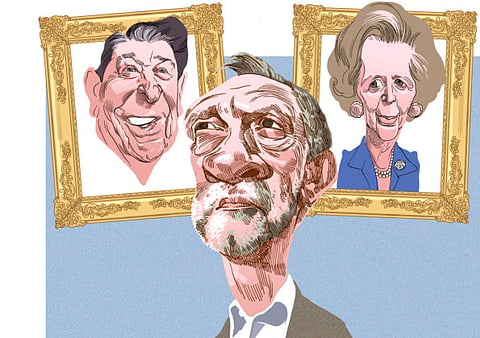History shows first impressions can be wrong
From Thatcher to Reagan, outsiders have proved the doubters wrong in the past — so can Corbyn

The election of Jeremy Corbyn as leader of Britain’s Labour Party has attracted unanimous disdain from the establishment press, categorising him as totally unelectable because of his extreme left-wing views. Since his election, he and his ideas have been continuously and persistently rubbished, with horror by former Labour leaders and with delight from the Conservatives.
But this is very like what happened to another new British party leader in 1975 who was ridiculed as unelectable because of her dangerously far-right views and was dismissed as a shrill housewife who could never be prime minister because Britain would never vote for a woman to be its leader.
And it is very like a bumbling B-movie star whose career started to fail after his 50th unmemorable movie when he took a job fronting for General Electric’s commercial TV programmes. As head of the Screen Actors Guild he also travelled to the United States, but only had one basic speech on the importance of individual freedoms, which he varied with homey stories drawn from local newspapers and the Reader’s Digest, allowing him to be dismissed as a complete lightweight by his first political opponent when he stood for office in California.
Margaret Thatcher went on to be one of the dominant political figures in British politics and transformed the British economy. Her legacy still defines the political debate in Britain and ‘Thatcherism’ remains a powerful force in Britain and worldwide.
Ronald Reagan went on to be a successful governor of California for two terms before becoming a transformative US president who saw inflation tumble from 12.5 per cent to 4.4 per cent, and grow to 7.91 per cent, while also ending the Cold War after escalating an arms race with the “evil empire”, and eventually challenging Mikhail Gorbachev to “tear down” the Berlin Wall a few months before the Soviet Union imploded.
What these two political histories show is how wrong first impressions can be. Today’s legends of both Thatcher and Reagan make it very hard to remember how very unlikely their eventual political success appeared when they first entered national politics in their very different arenas.
Corbyn’s politics would be damaging to much that has been built in Britain, but maybe he has found something that other politicians in today’s Britain have missed. All the main parties have seen their memberships crash, and the dramatic rise of alternative parties such as the Scottish Nationalist Party and the United Kingdom Independence Party, but rather than change, they have insisted on offering the people the same policies focused on the virtues of centrist politics.
Complex web of complicity
But outside the Westminster bubble, the drive for austerity after the crash of 2008 has hurt millions of voters who see that the bankers and regulators who caused the crash remain largely untouched. They also see the lack of substantive action over the complex web of complicity exposed by the hacking scandal in which politicians, media, police and public prosecution services and other establishment bodies failed to act to stop gross corruption. They also remember the MPs’ payments scandals.
So it may be that Corbyn has tapped into a profound need for change, which has not been recognised by others. It is a mistake to write off his political positon so quickly. History shows how Reagan and Thatcher came to power with very simplistic ideas that they turned into something powerful as they went along. So it is careless for the Conservatives to take delight in the gathering split as large numbers of heavyweight Labour politicians decline to work with their new leader. What they now need to watch is if Corbyn has the political skill to drive his position forward and build on his remarkable mandate as leader of his party.
The key to Thatcher’s success in winning the 1979 election was her long-forgotten but powerful attacks on Jim Callaghan’s government and his Winter of Discontent, using TV and the Commons to continually attack Labour and make them look increasingly incompetent while delighting her growing support in her own party.
And she was doing all this from her position as a total outsider who had come forward when others hesitated, leaving her with vicious rivals and enemies in her own party. If she had failed in 1979 she would have been dumped very fast by a vengeful party anxious to forget her, but as it was, she spent her first term getting rid of the ‘wets’ and rebuilding the Conservatives into her own party.
Reagan was much more subtle in office than his simplistic rhetoric indicated, astonishing Democrats by being willing to compromise when necessary. But in foreign affairs, he caught the tide by refusing to work with the Communists in the Soviet Union and helped trigger the internal forces that led to its collapse.
If Corbyn is to get anywhere outside his far-left ghetto, he cannot pay too much attention to the doubters in his own party, but has to find a way to reach out to the public and build on his landslide victory in his party, which he has helped transform with tens of thousands of new members — and they cannot all be from the Workers Revolutionary Party. The majority are energised and young people looking for change.


